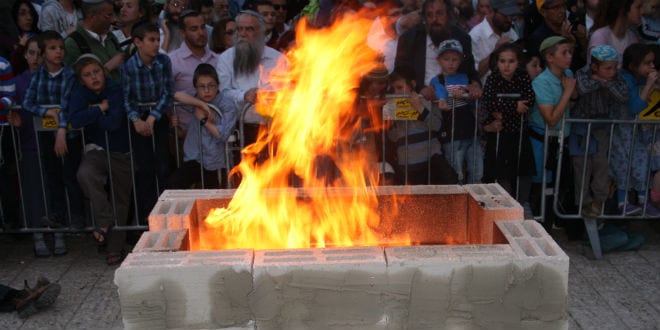One week after the Israeli elections next month, a reenactment of the Passover Temple service will be held. Hidden in the elections is a Temple Mount agenda that may determine whether the ceremony will be a reenactment or an actual service that will return the most important element of the Jewish Temple.
On Monday, April 15th, the Sanhedrin will be overseeing a spectacular full-dress reenactment of the Passover offering, the most important sacrifice an individual brings to the Temple. The ceremony will be held at the Davidson Center adjacent to the Temple Mount.
When the Temple stood, all of the Jewish people came to Jerusalem and organized into groups to celebrate the Passover seder. Each group sent a representative to the Temple to bring a lamb which would be ritually prepared by the priests and its blood sprinkled on the altar. The lamb would then be taken home to be cooked and eaten. The ritual was so important that any Jew who did not perform it was sentenced to karet (being cut off from the Jewish people).

The reenactment will be performed by Kohanim (Jewish men descended from Aaron the priest) wearing the Biblically mandated garb and using utensils that were prepared for use in the Third Temple. Silver trumpets will be played as they were in the Temple. The organizers have arranged the proper permits to allow for a lamb to be slaughtered and cooked on site. The meat will be distributed to the public.
This will be the eighth annual Passover sacrifice reenactment with the attendance growing each year. Last year, more than 1,500 people attended.
It is important to note that the Israel elections will take place on April 9, just six days before the reenactment and ten days before the eve of Passover when, if the government would permit, the actual Passover sacrifice would be performed.
“The Passover sacrifice can only be offered in one place; on the Temple Mount,” Rabbi Weiss told Breaking Israel News. “It does not require an actual Temple structure but it does require an altar that is built to adhere to the Biblical requirements. This altar we have and it can be transported and lowered into place in a matter of a few hours.”
The Sanhedrin recently performed an intense study concerning the current status of the Passover offering and concluded that at this juncture, one sacrifice made at the Temple Mount brought in the name of the entire Jewish people would suffice.
“This is an essential element of Judaism,” Rabbi Weiss said. “There is nothing that can stand in its place and we are forbidden from doing it in any other location.”
There are a few Israeli politicians who advocate Jewish rights on the Temple Mount and Rabbi Yehudah Glick of Likud is undoubtedly one of the most powerful voices calling for religious equality at the site. But Weiss pointed out that there is only one Israeli politician who has attended every Temple reenactment: Moshe Feiglin, head of the Zehut party.

“The Temple Mount is the most important site to Judaism, the unification of Jerusalem in 1967 the culmination of the founding of the State of Israel,” Weiss pointed out. “Jerusalem, specifically the Temple Mount, is the focal point of any negotiations between the Palestinians and Israel. It is astounding that no Israeli politicians except for Feiglin are willing to take a stand for it.”
Weiss emphasized that the Sanhedrin is not specifically endorsing Feiglin’s candidacy.
“Due to its central role in Judaism and in politics, we call on the candidates of all the parties to openly discuss the Temple Mount,” Rabbi Weiss said. “The connection between the elections and Passover is clear. This election comes in time to open up the gates for Jews to once again observe the Torah commandments of Passover in completeness.”
The Temple Mount became the focus of international concern one month ago when Palestinians rioted on the Temple Mount, breaking into an area adjacent to Sha’ar HaRachamim (Gate of Mercy, also known as the Golden Gate). They spontaneously declared it to be a mosque, the fourth established on the Temple Mount since Israel conquered the site. Israeli and international law require equality of religions at holy sites which should allow for Jewish prayer on the Temple Mount but the Israeli police cite security concerns to prohibit this.
“The Temple Mount is not only central to Judaism but it is a political stumbling block that every Israeli leader should be relating to,” Weiss said. “Perhaps seeing an image of the height of the Temple service, the Passover offering, will remind Israel, its leaders, and the world, that they need to relate to the Temple as one of the central issues of our time.”
Sales from commemorative coins issued by the Sanhedrin provide the funds for the Temple reenactments. The Sanhedrin recently issued a coin featuring the image of Nikki Haley, the former U.S. Ambassador to the UN in recognition of her efforts to combat anti-Israel bias. The Sanhedrin invited Ms. Haley to serve as the honorary president of a Biblically mandated organization of 70 Nations. The coin can be purchased on the Mikdash Tzion website.
Source: Israel in the News

